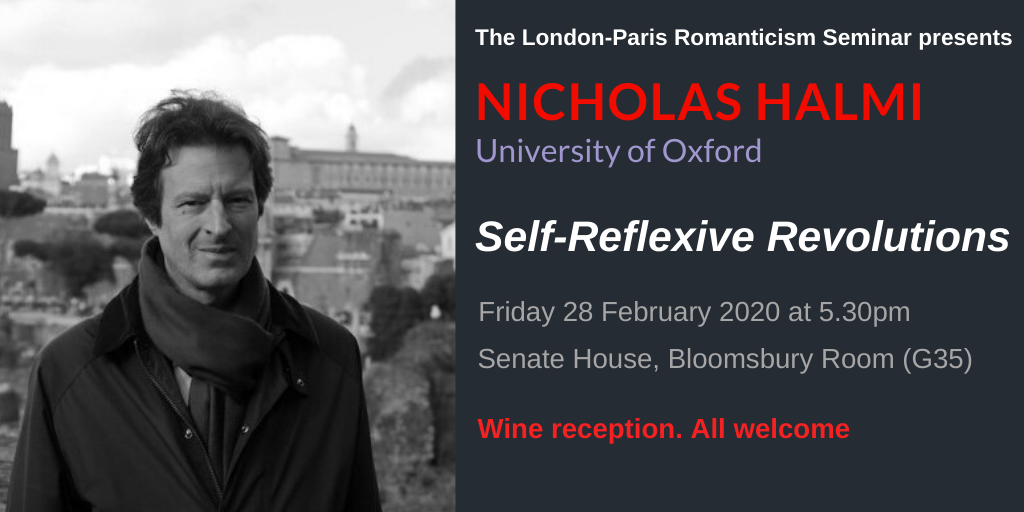
The next meeting of the London-Paris Romanticism Seminar will take place on Friday 28 February (please note change of date) in the Bloomsbury Room (G35, ground floor) at Senate House, University of London, starting at 5.30. As our guest speaker, we are delighted to welcome Professor Nicholas Halmi of the University of Oxford, who will present a paper entitled Self-Reflexive Revolutions. This will be followed by a discussion and wine reception. The event is free and open to everyone, including postgraduates and members of the public. No booking is needed.
Nicholas Halmi is Professor of English and Comparative Literature at the University of Oxford and Margaret Candfield Fellow of University College, Oxford. He is the author of The Genealogy of the Romantic Symbol (Oxford University Press, 2007), editor of the Norton Critical Edition of Wordsworth’s Poetry and Prose (2013) and Northrop Frye’s Fearful Symmetry: A Study of William Blake (Toronto, 2004), co-editor of the Norton Critical Edition of Coleridge’s Poetry and Prose (2003), and textual editor of the Opus Maximum in Coleridge’s Collected Works (Princeton, 2002). His most recent publication is the chapter “European Romanticism” in The Cambridge History of Modern European Thought (2019). He is currently completing a book on aesthetics and historicism, History’s Forms: Aesthetics and the Past in the Age of Historicization, 1650-1850, for Oxford University Press.
Regarding the subject of his talk, Nicholas writes:
“If anything can be said to characterize Romanticism as an historical period, it is its self-definition as a revolutionary period. As a consequence of its semantic development in the eighteenth century and its alignment with the concept of crisis as a moment or process of epochal transition—already before the French Revolution—the concept of revolution could function simultaneously as a rhetoric device and as an historical category. One the one hand it announced the rejection (whether desired or feared) of an existing state of affairs (whether political, philosophical, or artistic), and on the other hand it designated the complete transformation of that state. Thus the label revolution both promised and confirmed radical change, to be judged positively or negatively depending on one’s perspective. This talk will examine the remarkable and paradoxical uses of the concept of revolution for historical self-interpretation in Immanuel Kant, Edmund Burke, Mary Wollstonecraft, Friedrich Schlegel, William Hazlitt, Francis Jeffrey, Thomas De Quincey, and others.”
302 thoughts on “London-Paris Romanticism Seminar: Nicholas Halmi, 28 February 2020, Senate House, University of London”
Comments are closed.